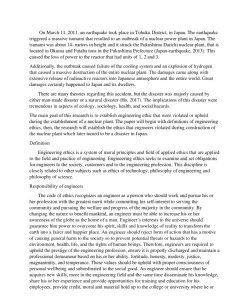Engineering ethics On March 11, 2011, an earthquake took place in Tohuku District, in Japan. The earthquake triggered a massive tsunami that resulted to an outbreak of a nuclear power plant in
Engineering ethics On March 11, 2011, an earthquake took place in Tohuku District, in Japan. The earthquake triggered a massive tsunami that resulted to an outbreak of a nuclear power plant in
On March 11, 2011, an earthquake took place in Tohuku District, in Japan. The earthquake triggered a massive tsunami that resulted to an outbreak of a nuclear power plant in Japan. The tsunami was about 14- metres in height and it struck the Fukushima Daiichi nuclear plant, that is located in Okuma and Futaba tons in the Fukushima Prefecture (Japan-earthquake, 2013). This caused the loss of power to the reactor that had units of 1, 2 and 3.
Additionally, the outbreak caused failure of the cooling system and an explosion of hydrogen that caused a massive destruction of the entire nuclear plant. The damages came along with extensive release of radioactive reactors into Japanese atmosphere and the entire world. Great damages certainly happened to Japan and its dwellers.
There are many theories regarding this accident, but the disaster was majorly caused by either man-made disaster or a natural disaster (Ho, 2017). The implications of this disaster were tremendous in aspects of ecology, sociology, health, and social hazards.
The main goal of this research is to establish engineering ethic that were violated or upheld during the establishment of a nuclear plant. The paper will begin with definitions of engineering ethics, then, the research will establish the ethics that engineers violated during construction of the nuclear plant which later turned to be a disaster in Japan.
Definition
Engineering ethics is a system of moral principles and field of applied ethics that are applied
